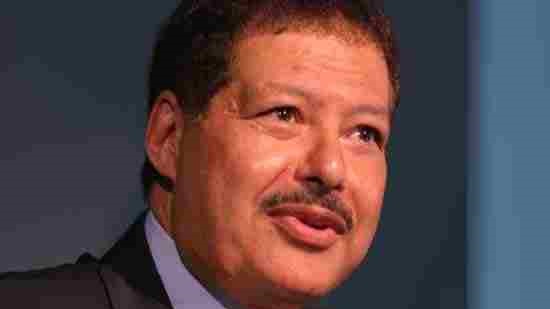A military funeral will be held for Egyptian chemist and Nobel Laureate Ahmed Zewail who died in the United States on Tuesday at the age of 70, Zewail City for Science and Technology’s media advisor and spokesperson Sherif Fouad said Wednesday.
Although military funerals are usually only held for former military personnel, Zewail received the Order of the Grand Collar of the Nile – the highest Egyptian state honour -- meaning that he is eligible for the distinction.
No date has been set for the military funeral, but Fouad said the late Zewail’s body will not arrive in Egypt before Sunday.
It was Zewail’s will to be buried in Egypt.
Egypt’s President Abdel-Fattah El-Sisi, Foreign Minister Sameh Shoukry and House of Representatives speaker Ali Abdel Aal mourned the loss of Zewail.
“[Zewail] will remain a symbol for the scientist who devoted his life honourably, faithfully and sincerely to scientific research, and the best teacher for generations of scientists of the future who will continue his 'journey of giving' to provide a better reality to humanity”, the El-Sisi said in a statement.
Zewail is a national pride to Egyptians and Arabs -- the consolation is that his memory will remain through the scientific research he left for humanity, Abdel Aal said.
“Zewail’s international standing has not stopped him from caring for his homeland at all times -- especially in recent years where wanted to make sure the Zewail City for Science and Technology became a reality as a glorious edifice for Egyptian scientists of the future,” Shoukry said.
The concept of the Zewail City was first proposed in 1999 and its cornerstone was laid in January 2000.
The project was revived over a decade later, when the Cabinet proclaimed it a National Project for Scientific Renaissance in 2011 and a year later, a law enabled students to enroll at the center’s Sheikh Zayed campus.
However, the building at the new campus in 6th of October is yet to be completed.
Around 550 scientific researchers are enrolled at the centre, the institute’s academic president told the privately-owned Al Shorouk newspaper on Wednesday, while a further 150 are expected to enroll soon.
California Institute for Technology (Caltech), where Zewail was the Linus Pauling Professor of Chemistry, a professor of physics, and director of the Physical Biology Center for Ultrafast Science and Technology, also mourned his loss.
"Ahmed was the quintessential scholar and global citizen," said Caltech President Thomas F. Rosenbaum, the Sonja and William Davidow Presidential Chair and professor of physics.
"He spent a lifetime developing instruments that interrogate nature in fundamentally new ways, and defining new directions that cut across the physical and biological sciences. Ahmed's fervor for discovery never abated and he serves as an inspiration to colleagues and generations of students. The Caltech community deeply mourns his loss," Rosenbaum said.
Britain’s ambassador to Egypt John Casson also paid his respects, tweeting, “Last night we lost Nobel laureate Ahmed Zewail. His legacy endures - a pioneer of science & 1 of the great Egyptians.”
The official Facebook page for the Nobel Prize posted Zewail’s banquet speech when he was awarded the 1999 Nobel Prize in Chemistry, and wrote that "the Nobel Prize Medal carried a deeper symbolic story which he traced in his banquet speech back to the beginning, his early life and education in Egypt."
"The medal I received… was designed by Erik Lindberg in 1902 to represent Nature in the form of the Goddess Isis – or as the Egyptians would say, ‘Eeses’ [the prominent ancient Egyptian Goddess of motherhood, nature, magic, healing and more]. She emerges from the clouds, holding a cornucopia in her arms and the veil which covers her cold and austere face is held up by the genius of science," Zewail said in the speech.
"Indeed, it is the genius of science which followed the race against time, from the beginning of astronomical calendars six millennia ago in the land of Eeses to the femtosecond time regime which you kindly honoured this evening,” the chemist added.
Zewail received the Nobel Prize for "his studies of the transition states of chemical reactions using femtosecond spectroscopy" in the fields of chemical kinetics and physical chemistry,” according to the official website of the Nobel Prize.
The chemist made it possible to observe atoms in motion on the femtosecond (10-15 seconds) time scale, which led to the establishment of the discipline of femtochemistry.
Later, he developed with his group 4D electron microscopy “for the direct visualization in the four dimensions of space and time of materials and biological behaviors,” Caltech said.
Zewail earned his BS and MS degrees from Alexandria University in 1967 and 1969, then received a PhD from the University of Pennsylvania in 1974 and completed an IBM postdoctoral fellowship at UC Berkeley.
He joined the faculty at Caltech in 1976 as an assistant professor, before becoming associate professor in 1978, then professor in 1982. From 1990 to 1997, he was Linus Pauling Professor of Chemical Physics, then he was named professor of physics in 1995, and then the Linus Pauling Professor of Chemistry in 1997.
Zewail was awarded the Order of Légion d'Honneur in 2012, the highest French Order, by the President of France.
He became a naturalised U.S. citizen in 1982.
He is survived by his wife, Demam Faham, and four children.
The U.S. embassy in Cairo mentioned Zewail’s passing on Wednesday and posted his banquet speech of 1999.
“He will be missed,” the U.S. embassy wrote.




